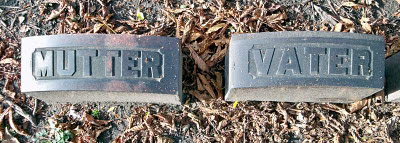pair of Pelz at Erie Street Cemetery
In Cleveland, there had been many people German born. German is a nationality, not a state; for depending on the time there were several German states. In the United States, the most common ethnic heritage is German. Now, for some people these German immigrants arrived in America long enough ago, that there is little self-identification with that past to-day. But, at one time it was the most taught and spoken non-English language in the United States. There were neighborhoods in many cities, and also farming communities which were mono-lingual teutonic. Pennsylvania Dutch was a misunderstanding of 'Deutsch', what the Germans call German.
The Germans came from eastern France, from Austria, several states (Bavaria, Baden, Württemberg, Hanover, Hesse and others) that were incorporated into Prussian Germany, and elsewhere. On some stones these birth lands are listed.
A mile south of Monroe Street Cemetery is Riverside Cemetery. It was opened some years after the War for the Union. The west side robber barons were buried there. At that point, the clientele at Monroe skewed poorer. Riverside has many impressive monuments.
The inscription, supra, is in Riverside. This couple was born in the, then, independent Hessen-Darmstadt, he from Bingen-am-Rhein. Caroline Norton wrote a poem, "Bingen on the Rhein", published in 1847. It was set to music, a few times. It was rewritten a few times. One short rewrite is the 'Legend of the Rebel Soldier', where the hero dies in a "dreary Yankee prison". It was a rewrite of an Irish version, to the tune of "Rolling Home to Dear Old Ireland".
In a dreary British prison where an Irish rebel lay,The original Norton ballade had seven stanzas of eight lines, each one ending "...Bingen on the Rhein".
By his side a priest was standing ere his soul should pass away,
And he faintly murmured "Father" as he clasped him by the hand,
"Tell me this before I die: shall my soul pass through Ireland?
A SOLDIER of the Legion lay dying in Algiers,Some stones say 'Mutter' (Mother) und 'Vater' (Father). Here there are two pair. A double pedestal with bolster stones, and a twin pair (one knocked off). They were laid out almost as pillows upon beds. The first pair is of Muellers, (Miller in English, very common Surname in both languages). Other common markings on these stones are the abbreviations 'geb.' and 'gest.' for geboren (born) and gestorben for died. They also say 'ruhe sanft' (rest gently).
There was a lack of woman's nursing, there was dearth of woman's tears;
But a comrade stood beside him, while his lifeblood ebbed away,
And bent with pitying glances, to hear what he might say.
The dying soldier faltered, and he took that comrade's hand,
And he said, "I nevermore shall see my own, my native land:
Take a message, and a token, to some distant friends of mine,
For I was born at Bingen, -- at Bingen on the Rhine. ...
 After 1918 (WWI) the German inscriptions become rare. In this pair at Monroe Street, die Mutter war im Jahre 1960 geboren und gestorben im Jahre 1916; the Father was born in 1844 and died in 1928.
After 1918 (WWI) the German inscriptions become rare. In this pair at Monroe Street, die Mutter war im Jahre 1960 geboren und gestorben im Jahre 1916; the Father was born in 1844 and died in 1928.






No comments:
Post a Comment